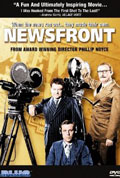
Directed by
Phillip Noyce
110 minutes
Rated PG
Reviewed by
Bernard Hemingway


Newsfront
Based on the history of Sydney-side film newsreel cameramen from 1946 to the advent of television in 1956, Phillip Noyce’s first full length feature film (his first feature, Backroads, ran 61 mins) was a deserved critical and commercial hit in its day, storming the Australian Film Institute awards in its year of release. It is a remarkable effort by Noyce who was one of the earliest graduates of the then newly established Australian Film, Television and Radio School and still today stands as one of the most accomplished Australian films ever made even if it is slightly too long and there appears to be no rationale for the switching between black-and-white and colour sections.
The film deals with the rivalry between the Cinesound and Movietone news companies during the 1940s and '50s, who went head-to head in a hotly-contested field that pre-dated the battles of today’s television networks for news supremacy. Of course it was the advent of television that led to the demise of the film newshounds as a species..
Controversial wordsmith Bob Ellis’s original script itself based on one by producer David Elfick, which was re-worked by Noyce after he fell out with Ellis, is part factual social history, part fictional drama. It reframes the historical commercial rivalry as one between cameraman Len Maguire (Bill Hunter) and his wheeler-dealer brother, Frank (Gerard Kennedy), Len working for the Australian-owned Cinetone, Frank for the US-owned Newsco. The film depicts the day-to-day competition in the field and seamlessly combines real news footage of the times with reconstructed scenes (notably of the Maitland floods) and integrates this with the semi-fictionalized narrative, one largely focussing on the main characters' personal lives.
The result, aided by the superb production design by Lissa Coote, Vincent Monton’s fine cinematography and William Motzing's jaunty score, is a fascinating portrait of Australia of the times, an era when the culture of “mateship” became firmly entrenched as the national character, although the winds of change were already stirring and there is a undertone of melancholy at the passing of the times as the local industry struggled to cope with the arrival of television.
In a career-making performance that became his stock-in-trade, Bill Hunter is effortlessly winning as Len, but Gerard Kennedy, Chris Hayward, John Ewart and Wendy Hughes who particularly in the black and white sections looks very much the Myrna Loy/Gene Tierney-style starlet, all help to make this one of the finest portrayals of the Australian "dinkum" ethos ever made.
Want something different?





